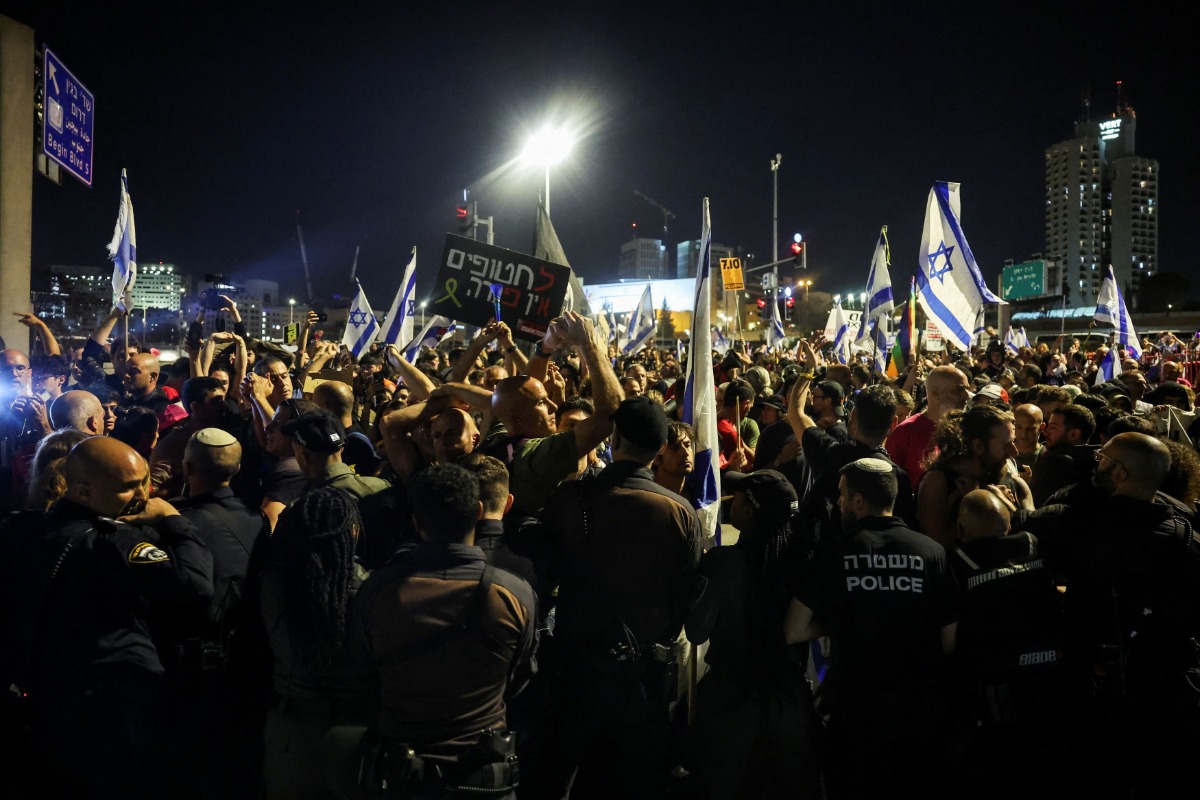Tens of thousands of people demonstrated in Jerusalem today against the government of Benjamin Netanyahu and against the exemptions that ultra-Orthodox Jews enjoy from the compulsory military service for all other Israelis, in demonstrations reminiscent of the mass mobilizations that took place across Israel last year against the Israeli far-right. government for the reform of the judicial system which he promoted and is promoting.
Organizations, including some calling for mass protests that rock Israel in 2023, rallied outside parliament, the Knesset, calling for new elections to change the government.
The protesters were also calling for a more equal distribution of the burden of military service that binds most Israelis.
About 600 soldiers have been killed so far since the Israeli offensive on the Gaza Strip and the Hamas massacre on October 7 in southern Israel. This is the highest number of military casualties in many years.
“Elections Now”
Israeli news television network N12 reported that today’s demonstration was the largest in volume since the start of the war. News websites Haaretz and Ynet reported that tens of thousands took part in the demonstration.
Demonstrators waved blue and white Israeli flags and chanted “elections now”.
Netanyahu’s cabinet is facing widespread criticism for failing to prevent the October 7 attack by Hamas, which killed 1,200 people and took more than 250 hostages in Gaza.
Israel’s war in the Palestinian enclave has escalated a long-standing source of friction in Israeli society, which is shaking Netanyahu’s coalition government. This is the exemptions granted to ultra-orthodox Jewish students to exempt them from conscription.
The Supreme Court, which has received numerous appeals calling for the immediate conscription of the ultra-Orthodox so that laws on equality between citizens are respected, had given the government until Wednesday to submit a detailed proposal for a bill.
A deep rift in the country
In Israel, military service is compulsory for all Israeli men and women, but ultra-Orthodox Jews (“Haredi” in Hebrew) can avoid conscription if they spend their time studying Judaism’s holy texts. This exemption was established since the establishment of the State of Israel in 1948 and has never been lifted since. Given the sensitivity of this issue that has reopened a deep rift in the country, the ruling coalition led by Netanyahu has not reached an agreement due to the objections of ultra-Orthodox parties in the ruling coalition who do not even want to hear a discussion on the issue conscription.
Netanyahu’s governing coalition relies heavily on an alliance with the two major ultra-Orthodox parties, Sass and United Torah Judaism, which strongly oppose haredim recruitment. A possible departure of these parties from the government would cause the fall of the governing coalition.
At a time when Israel is almost six months into a war against Hamas in the Gaza Strip, this exclusion of the ultra-Orthodox is increasingly criticized in society, a segment of which believes that ultra-Orthodox Jews should, like others, offer in support of the security of the country and to serve their military service.
Military service (32 months for men and two years for women) is mandatory for young Israeli men and women, but almost all ultra-Orthodox are exempt from military service, thanks to an agreement that offers young men who study with full-time Talmud schools the ability to defer their military service each year. Young religious women are automatically excluded.
The ultra-Orthodox make up about 14% of Israel’s Jewish population, according to the Israel Democracy Institute (IDI), or nearly 1.3 million people. About 66,000 ultra-Orthodox men of military age benefit from this deferment, according to military figures. Most Haredim demand that this exemption be maintained for all students, seeing the military as incompatible with their values.
To resolve the controversy
With a March 31 deadline looming for the government to enact legislation to resolve the decades-long standoff over the thorny issue, Netanyahu filed a last-minute request with the Supreme Court last week seeking a 30-day postponement.
In an apparent settlement, the Supreme Court gave government officials until April 30 to submit additional arguments. But in an interim ruling, he also ordered the suspension of state funding for students liable for military service from Monday.
At a press conference in Jerusalem, Netanyahu said he was confident a solution to the issue would be found. He added that holding elections would paralyze the country for months while the war is at its height, as he says Israel is very close to victory.
In Tel Aviv, some families of hostages and their supporters blocked a major highway to protest what they described as Netanyahu’s failure to bring back their loved ones.
And yesterday, Saturday, thousands of Israelis took to the streets of Israeli cities to protest against the far-right government. In Tel Aviv, protesters demanded early elections as well as the release of hostages still being held by Hamas in Gaza. Demonstrations were also held in other cities, such as Jerusalem and Haifa.
Source: RES-MPE
#Israel #Thousands #streets #Netanyahu #government


